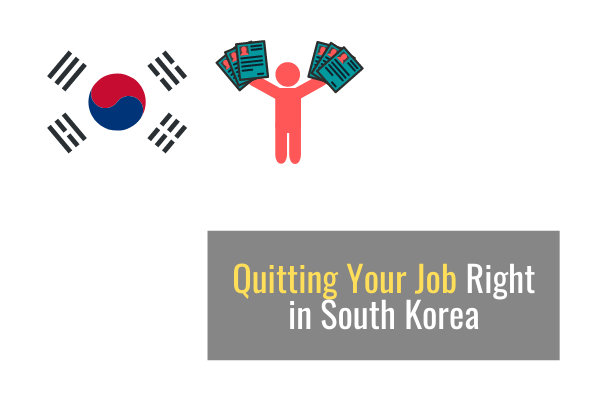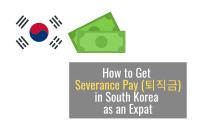This step-by-step guide shows you how to quit your job in South Korea as an expat. It has tips on writing a letter of resignation and an example of a letter of release in Korean and English.
You’ll learn how to resign legally and:
- How much notice to give
- What’s expected of you
- Where to get help if you need it

Quick Tips for Resigning in South Korea
Here are a few ways to maintain professionalism and make the process smoother.
- Your visa type will determine how you quit your job.
- The minimum notice (for example, two weeks) before resigning depends on your contract or company manual. That being said, try to give a month’s notice to maintain goodwill.
- It’s necessary to provide a resignation letter in Korean and English.
- Helping them find, train and onboard your replacement will be expected.
- Document everything including your tasks and meetings with management.
- Stay positive, you’ll survive this experience and be better off for it
Working in South Korea can be a rewarding experience. But all good things come to an end, and you might find yourself needing to quit your job.
*** Disclaimer ***
This post is not intended as legal advice. Korean Labor Laws change frequently. Consult a lawyer who specializes in Korean Labor Law when in doubt.
***Update 2023***
It was confirmed by a recent phone call that you simply need to leave the country and can reapply immediately overseas without a letter of release, when working under a sponsored visa such as E-2. It’s unclear when this changed or if it was always this way. It helps to check since Korean immigration laws are unclear. It’s speculated that employers are required to sign a letter of release, even though many claim they don’t.
***
Common Mistakes when Quitting a Job in Korea
Quitting a job in Korea is different from what you’re used to. Here are some errors I’ve seen when expats resign:
- Getting emotional – stay calm and don’t shout or accuse, you’ll only make things more difficult
- Taking things personally – easier said than done, but it’s just business
- Signing amendments to contracts at the last moment – be polite but refuse to sign anything presented to you when quitting
- Not providing a resignation letter – you’re not officially resigned until you present one to your boss or preferably company owner
- Not offering to help find, train and onboard your replacement (인수인계) – this is considered basic etiquette in South Korea, so it’s a good idea to go through the motions at least
- Expecting things to work according to the contract – they’re more of a guideline in Korea, so keep that in mind if unexpected events occur
- Not making an effort to understand your boss – this one can be tricky but helps a lot, try to put yourself in their shoes and you might have an easier time
- Not documenting every meeting and task you complete – trust but verify, records will be your saving grace if matters deteriorate
- Criticizing your employer or company – keep this to yourself or among friends
- Accepting a counteroffer – your reputation at that company will be forever tainted as a traitor, so it’s best to move on
- Not asking for a Letter of Recommendation – this is uncommon in South Korea, but you might want one for a job elsewhere

How to quit your job with an F series visa or permanent residency
Step 1. Have the next job lined up
Pretty straightforward. There are many opportunities for foreigners in South Korea, but not much safety net for those who quit (you get good unemployment benefits if you’re fired).
It can take a while to find a job that isn’t English teaching, so have something in the works.
Step 2. Give proper notice and know your rights
This one can be a little vague. There’s no legal requirement to provide notice, but try negotiate with your boss to avoid liability.
Make your notice official by providing a resignation letter dated on the final day you intend to work. Here’s a template you can use:
Korean Letter of Release (사직서) Example
소속:
직위:
성명:
입사일자:
퇴사 예정일:
사직사유:
20XX년 XX월 XX일
신청인:
English Letter of Release Example
To:
Position:
Name:
Start Date of Employment:
Final Date of Employment:
Reason for Resignation:
20XX year XX month XX day
Signature:
Also, make sure not to sign anything unless you understand it.
It’s illegal to penalize workers when they quit a job with salary deductions for things like:
- travel expenses
- recruiter fees
- airfare
- pension contributions
Don’t take it personally if you’re asked to sign something or pay a penalty. This is common practice. Just be polite, but firm when refusing.
Step 3. Keep records
It’s a good idea to keep meticulous records of:
- what your duties were and what you accomplished
- how many hours a week you worked
- how much you were paid each month
A simple Excel Spreadsheet will work for most of these, but try to get official documents from the company if possible. You never know when you’ll need them.
Step 4. Help out with the transition
Offer to assist with the recruitment, training and onboarding of your replacement.
- Make a list of your duties and how to perform them.
- Be nice to your replacement, you might be asking them for help getting a job later.
- Have your replacement shadow you for a few days.
- Introduce them to your coworkers and help them get comfortable with the lay of the land.
- Give them some inside tips on nice cafes or restaurants nearby.
Avoid speaking poorly about the company or employees. This will come back to haunt you at some point. You decided to leave, because you gained all you could from the job. Your replacement hasn’t had the same experiences, and things will be new for them.
Also, everyone has different tolerance levels and preferences. The things that made you quit could be appealing to the new hire.
Step 5. Be patient
Every day during this transition period can feel like a week. There will be unexpected requests at this point, so take it in stride.
Make sure you’re working on yourself during this time and learning all you can about your next position.
Step 6. What to do if there’s conflict
Things don’t always go according to plan and you might find yourself struggling with management. Don’t get angry, get prepared.
Find out your rights and make sure the company is aware of them.
I recommend consulting a lawyer or a local, unless your Korean is perfect.
You can also get help from organizations like the Seoul Foreign Resource Center.
Go to the Labor Board (고용노동부 or MOEL), preferably with some knowledge of Korean or a local friend.
Present your info to a case worker. They’ll contact the company on your behalf.
The Labor Board does their best to speed things up, but results might take a few weeks.
Be prepared to hear some counter complaints from your former employer such as:
- you didn’t work hard
- took extra-long lunches
- and so on
This is a cultural thing where blame is assigned to the group. It helps not to get emotional and just wait things out.
Avoid direct contact with your former employer unless instructed by the case worker.

How to quit your job with an E-2 visa
The process of quitting on an E-2 visa are the same as above with one major difference.
Your fate is somewhat in your employer’s hands, because they’re sponsoring you.
More about working as an English teacher in South Korea
So, you’re at a disadvantage compared to F visa holders.
You need your employer to sign a Letter of Release (LOR) if you intend to get another job in South Korea without leaving the country.
They’ll have more experience in this situation than you as well.
You won’t be in physical danger, but be prepared for some mental warfare.
Otherwise, you have to go elsewhere and wait until your contract period is over before applying again in South Korea.
Here are your options:
- Be on really good terms with your employer to get a Letter of Release. Then you can get another E-2 or D-10 Job Seeker’s visa, and have 6 months to apply in person.
- Be ready to make some concessions like airfare reimbursements or recruiter fees to get a Letter of Release. It’s illegal for employers to penalize you, but playing ball might save you months of time waiting to get another job in South Korea.
- Change your visa type to F. Marry a Korean or become one before your 14 days to leave the country are up. You can also switch to F-5 Permanent Resident if you’ve been in the country for five years and qualify.
Be prepared to go home and apply again after your contract expires.You can simply leave the country and reapply immediately after.
You’ll receive your Letter of Release on your final day if they agree to give you one. Make sure to stay until you get it.
My Experience Resigning from my Job in Korea
I worked at a Korean company for five years both part-time and full time.
The office environment was demanding, and I never really had a job description besides “Overseas Marketing Manager”. This encompassed many duties like lecturing, interviewing and entertaining overseas visitors.
I would get home at 11pm some days and often worked weekends, but I learned many useful skills like:
- How to interact with Korean clients
- How to write emails in Korean
- How to answer the phone in Korean
- How to create a company profile
- How to interview potential employees
- How to approach overseas companies
- How to speak in front of large groups
- How to get along with coworkers from different backgrounds
- How to train employees
Some of these helped me start a business and a blog.
More about living in South Korea as an Expat
When it came time to move on to the next challenge, I wanted to do things right.
I made sure to:
- give one month’s notice
- provide a resignation letter in Korean and English
- help train my replacement
- not sign anything I didn’t understand
Things went smoothly except the part about getting my severance pay. I left on good terms with most of my coworkers and keep in touch with them to this day.
Korean labor laws
South Korea has some progressive labor laws. For example:
- It’s rare to be fired after working three months (수습기간 or training period) at a company, because the company has to pay unemployment (실업급여)
- Your employer is legally obligated to provide four kinds of insurance (4대보험)
- Medical insurance costs you about 5% of your salary and covers most things
- Everyone is entitled to one month’s severance pay for every year worked at a company
- You’re also entitled to reimbursement for pension payments you contributed
- Employment taxes are relatively low at under 20%, depending on your income level
- It’s illegal to penalize you financially by deducting recruiter fees or plane ticket costs from your pay when you quit
Unfortunately, there are some gray areas that aren’t specified by law. For example:
- How much notice you should give before quitting (the law is vague and can be found here
- What happens when you break an employment contract
- Does your employer have to sign a Letter of Release (some immigration officers claim they have to and others don’t)
- How many sick days are provided (depends on the company)
FAQ
How long do I have to leave South Korea after my E-2 Visa expires?
14 days. Enough time to say goodbye to everyone and go on a trip.
Do I have to pay for my flight to South Korea if I break contract on an E2 Visa?
No, it’s illegal for your employer to penalize you, unless it’s in your contract.
Do I need a Letter of Release to get another English Teaching job in South Korea on an E2 Visa?
Yes, unless you don’t mind leaving the country and reapplying. You’ll need to present a LOR (Letter of Release) to immigration if you want to get another E-2 Visa. There are rumors that immigration will approve another E-2 without one, but it depends on your agent.
Did we miss anything?
Quitting a job in South Korea as an expat can be complicated.
Let us know your resignation tips in the comments below!


Can you please show me the site / law which says employees need to give 30 days notice to leave in Korea.
Many Thanks
Hi Winnie,
It’s up to the contract with your employer, but you can find the law here (Article 660 of Civil Act).
My contract said to give them 60 days notice but I feel that is absurd and plan to give them 30 days notice instead. What do you recommend?
Hi Erik,
That sounds like a tricky situation. 60 days is a long time when you’re on your way out.
You can take it to the labor board and see what they say.
In the end, you might have to negotiate with your manager. Let me know how it works out!
Hi, I need some advice. I am not on speaking terms with my employer.
I quit my job. I left apartment same day. I had tried to give 6 weeks to two months prior notice but it wasn’t accepted and then due to a deteriorating situation I left.
My residence card says my E2 visa expires 2022. 12.16.
If my employer went to immigration would he have canceled my E2 visa or how long do I have until I am illegally in korea?
My return home flight is over the 14 days.
Hi Amy, sorry to hear about your rough situation.
It really depends on the employer. They probably didn’t cancel your E-2 visa, because they want to prevent you from applying to other jobs (I’m guessing they didn’t give you a signed letter of release either). Try going to the Labor Board and find out your options, visa status and how long you can stay. You most likely won’t get a clear answer, so you might want to take the next step.
Apply for the D-10 visa at immigration which would give you 6 months to look for a job or at least not worry about overstaying. Or you can just explain your situation and ask for a 14 day extension. Either way, you will be fine and there are people who want to help you. Feel free to let me know how it goes.
Thank you for your article. Nice read and informative!
Hi Kati, I’m so glad to hear it! Let me know if you have any questions.
Article 7 of the LSA states that an employer can not force an employee to work against their will. If someone feels their physical or mental health is in danger through 30 more days of work at an unsafe place, I’m not sure how the law can force someone to physically go somewhere against their will.
Yes that contradicts,
“Article 660 (Notice of Rescission for Future of Contract of Employment in which No Period has been Fixed)
(1) If no period for the employment has been fixed by the parties, either party may give notice to the other party of his intention to rescind the contract for the future at any time.
(2) In the case of paragraph (1), the notice of intention to rescind for the future becomes effective after one month has elapsed from the date of receipt by the other party of such notice.
(3) If remuneration has been fixed on a set and regular periodical basis, the rescission of the contract for the future shall be deemed to be effective after one full period has elapsed from the date of completion of the current period during which the other party received the notice of intention to rescind the contract for the future.”
I’d recommend speaking with a member of the Labor Board who can help mediate the process.